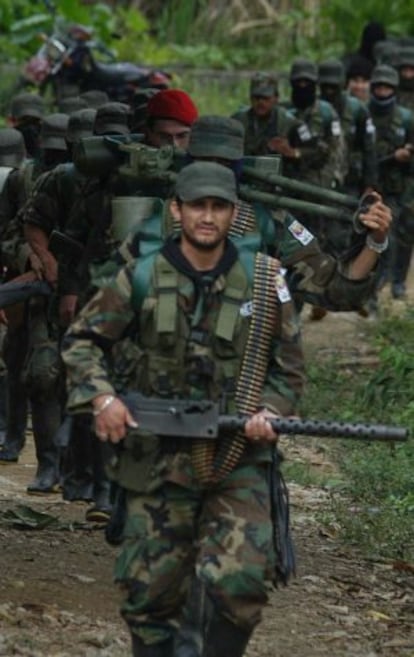Colombia’s FARC guerrillas declare unilateral and indefinite ceasefire
Government must decide whether to do the same or risk ending truce via military action

Colombia’s FARC guerrilla movement announced an indefinite, unilateral ceasefire on Wednesday.
The decision came just a few days after talks between FARC rebels and the Colombian government were resumed in Havana, where negotiations have been taking place over the last two years.
“We have resolved to declare a unilateral ceasefire and an end to hostilities for an indefinite amount of time, and this should transform into an armistice,” explains a statement released on its website.
FARC leaders said “this unilateral ceasefire, which we hope will extend as time goes on, would only end if it becomes evident that our guerrilla structures have been the target of attacks by public forces.”
The ceasefire is scheduled to begin on December 20, but the guerrilla group has set one condition: that it should be verified by at least one international organization among a list that comprises Unasur, a regional intergovernmental group; the International Red Cross Committee; CELAC (the Community of Latin American and Caribbean States); and the leftist social and political movement Frente Amplio por la Paz.
Colombian President Juan Manuel Santos suspended peace talks with the FARC in November after members of the rebel group abducted an army general and two aides, who were all later released.
FARC leaders said the ceasefire would only end if the group was “the target of attacks by public forces”
Until now, negotiations had been taking place without a ceasefire in place and the guerrilla group had continued to carry out attacks, prompting heavy criticism from opponents of the talks.
President Santos had opposed a truce on the grounds that in the past the guerrilla group had used them to secretly re-arm itself during failed peace talks with previous administrations. At the same time, the military continued to conduct operations against the rebel group.
The desire to prolong this new ceasefire is unprecedented, said Jorge Restrepo, a security analyst at the Resource Center for Conflict Analysis (CERAC), who noted the difference between this and other temporary truces called by the FARC during the Christmas holidays or presidential elections.
“This is a very important gesture towards peace, but they do set that condition about not being the target of attacks,” said Restrepo. “This makes the government lose the initiative, and forces it to make a decision” regarding whether to also call a similar ceasefire.
If the Santos administration chooses not to and the military attacks the FARC, it would make the government look responsible for the breakdown of the truce.
Ariel Ávila, a researcher at the Peace and Reconciliation Foundation, believes the FARC has made a risky decision, because the big question now is what kind of military action would end the ceasefire. “It’s very good news, but the technique has yet to be defined, and that’s where I see a risk,” he said.
Restrepo said that he does not believe that the FARC’s announcement is the result of any deal reached in Havana. But Ávila said he believed it is a consequence of the tension created by the abduction of the army general, and that “it proves that the FARC are beginning to take public opinion into account.”







































